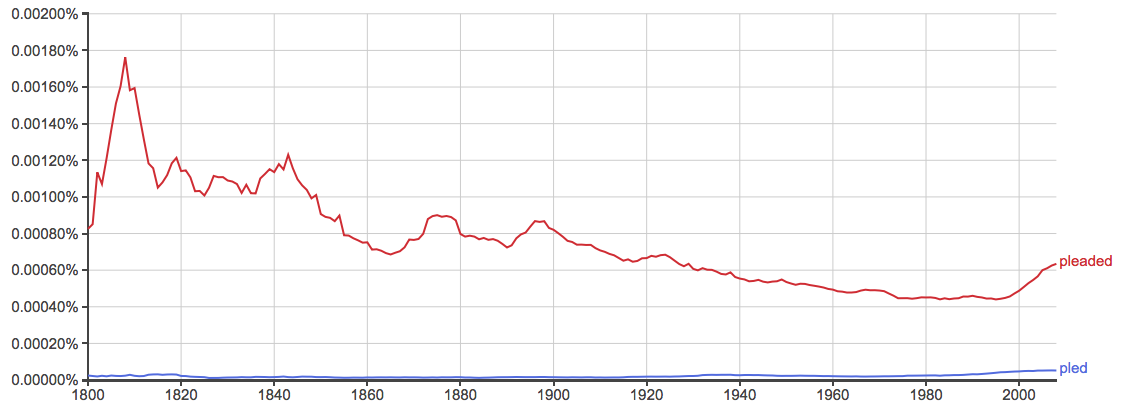In English, the line between regular and irregular verbs can be blurry. Some verbs have regular conjugations in some tenses, but are irregular for others.
It can be difficult to remember which verbs are regular and irregular for English speakers. Nonnative speakers and beginning writers are just as confused.
Regular verbs can change from present to past tense by adding -ed to the end of the word. Irregular verbs have a variety of other methods for conjugating into past tense that aren’t always intuitive.
There are three words that are sometimes used as the past tense version of the verb plead. It is sometimes conjugated as a regular verb, to form pleaded. However, some writers use pled or plead (pronounced as a rhyme for pled or sled) in this context.
Read on to learn which of these forms is accepted as standard in formal writing.
What is the Difference Between Pleaded and Pled?
In this article, I will compare pleaded vs. pled. I will use each in a sentence to show their uses, and I’ll give you an idea for how to remember when to use each word.
When to Use Pleaded
 What does pleaded mean? Pleaded is the past tense form of the verb plead, which can mean to beg or, in a legal sense, to claim guilt or innocence.
What does pleaded mean? Pleaded is the past tense form of the verb plead, which can mean to beg or, in a legal sense, to claim guilt or innocence.
Pleaded has long been the preferred form of this word, and still predominates variants pled and plead by a rate of 3:1 and 13:1, respectively, according to Garner’s Modern American Usage.
Here are some examples of pleaded in a sentence.
- The defendant pleaded guilty to all charges.
- Satine pleaded with her grandmother to be allowed to attend the masquerade.
- Though Keith had pleaded and pleaded with his students, they still demanded an open book test.
- The former manager of a Wells Fargo Bank branch in Glendale has pleaded not guilty to federal charges that he was part of a scheme to launder the proceeds of a “mass mailing scam” targeting holders of U.S. trademarks, authorities said Thursday. –LA Daily News
When to Use Pled
 What does pled mean? Pled is a variant of pleaded that is sometimes used as the simple past or past participle form of to plead.
What does pled mean? Pled is a variant of pleaded that is sometimes used as the simple past or past participle form of to plead.
Despite gaining popularity in America, pled has never been considered completely standard in American or British English. In formal writing, it is either considered colloquial or incorrect.
The popular American journalistic style guide The AP Stylebook states that writers should not use the colloquial past tense form pled, yet despite most journalists’ strict adherence to AP Style, some outlets use pled on occasion.
- He wanted to proceed in court on both cases but, on the advice of the late Joe Paterno, pled guilty to three misdemeanors and was sentenced to two years’ probation. –The Washington Post
Still, pleaded vastly predominated pled is written text, as the below graph of pleaded vs. pled in American English (where pled is most popular) shows.

Plead (pronounced as a rhyme for pled) is also used the same way. As a past tense verb, plead is even less common than pled, and is considered a mistake.
Therefore, for academic or professional audiences, avoid pled and plead in favor of pleaded in these situations.
Trick to Remember the Difference
 If you’re having trouble choosing pled or pleaded in your writing, remember that pleaded is considered standard in all situations for all audiences. One might say that pled is dead.
If you’re having trouble choosing pled or pleaded in your writing, remember that pleaded is considered standard in all situations for all audiences. One might say that pled is dead.
Since pled and dead rhyme, this should be an easy trick to remember.
Summary: Pled vs. Pleaded
Is it pled or pleaded? As English evolves, uncommon or previously incorrect words can sometimes become common. Once they become common, they become accepted as standard.
This has not happened yet for pled. Pleaded is still considered standard. Pled is considered informal, or even wrong. If you are writing a paper for school or a manuscript for publication, pled should be avoided in favor of pleaded.
You can remember to avoid using pled in academic or professional writing by rhyming pled with dead in your head. Pleaded is the safe choice in all situations.
If you have trouble remembering choosing pleaded or pled in your writing, you can refer back to this article for a quick reminder.
Contents
